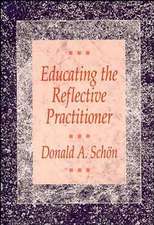Showing and Doing: Wittgenstein as a Pedagogical Philosopher
Autor Michael A. Peters, Nicholas C. Burbules, Paul Smeyersen Limba Engleză Paperback – 30 apr 2010
| Toate formatele și edițiile | Preț | Express |
|---|---|---|
| Paperback (1) | 440.82 lei 6-8 săpt. | |
| Taylor & Francis – 30 apr 2010 | 440.82 lei 6-8 săpt. | |
| Hardback (1) | 1218.08 lei 6-8 săpt. | |
| Taylor & Francis – 30 mar 2008 | 1218.08 lei 6-8 săpt. |
Preț: 440.82 lei
Preț vechi: 518.62 lei
-15% Nou
Puncte Express: 661
Preț estimativ în valută:
84.37€ • 87.75$ • 70.70£
84.37€ • 87.75$ • 70.70£
Carte tipărită la comandă
Livrare economică 13-27 martie
Preluare comenzi: 021 569.72.76
Specificații
ISBN-13: 9781594514494
ISBN-10: 1594514496
Pagini: 264
Dimensiuni: 152 x 229 x 15 mm
Greutate: 0.36 kg
Ediția:1
Editura: Taylor & Francis
Colecția Routledge
Locul publicării:Oxford, United Kingdom
ISBN-10: 1594514496
Pagini: 264
Dimensiuni: 152 x 229 x 15 mm
Greutate: 0.36 kg
Ediția:1
Editura: Taylor & Francis
Colecția Routledge
Locul publicării:Oxford, United Kingdom
Notă biografică
Michael A. Peters is Professor of Education at the University of Illinois at Urbana-Champaign and coauthor of Creativity and the Global Knowledge Economy (Peter Lang, 2009).
Nicholas Burbules is a Professor of Education at the University of Illinois–Urbana-Champaign.
Paul Smeyers is Professor at the Katholieke Universiteit Leuven in Belgium.
Nicholas Burbules is a Professor of Education at the University of Illinois–Urbana-Champaign.
Paul Smeyers is Professor at the Katholieke Universiteit Leuven in Belgium.
Cuprins
Introduction Showing and Doing: An Introduction, Nicholas C. Burbules, Michael A. Peters, Paul Smeyers; Chapter 1 Wittgenstein as Exile: A Philosophical Topography, Michael A. Peters; Chapter 2 “Perspicuous Representation,” Genealogy, and Interpretation, Paul Smeyers, Michael A. Peters; Chapter 3 Tractarian Pedagogies, Nicholas C. Burbules, Michael A. Peters; Chapter 4 Images and Pictures, Seeing and Imagining, Paul Smeyers; Chapter 5 Philosophy, Therapy, and Unlearning, Michael A. Peters; Chapter 6 Writing the Self: Wittgenstein, Confession, and Pedagogy, Michael A. Peters; Chapter 7 Wittgensteinian Pedagogies: Cavell on the Figure of the Child in the Investigations, Michael A. Peters; Chapter 8 The Practice of Ethics and Moral Education, Nicholas C. Burbules, Paul Smeyers; Chapter 9 Education as Initiation into Practices, Paul Smeyers, Nicholas C. Burbules; Chapter 10 Tacit Teaching, Nicholas C. Burbules; Chapter pos Postscript: The End of Philosophy?, Paul Smeyers, Nicholas C. Burbules;
Descriere
Three prominent Wittgenstein scholars introduce the broad educational significance of Ludwig Wittgenstein’s work to a wider audience of educational researchers and practitioners through provocative, innovative, and playful readings of his work. They vividly demonstrate the influence of his thinking and its centrality to understanding our contemporary condition.
Wittgenstein fundamentally shaped contemporary theories of language, representation, cognition, and learning. The book also traces the "pedagogical turn" of his thinking during the period from 1920 to 1926. What is most radical about Wittgenstein’s later work is that it suggests learning and initiation into practices are fundamental to understanding his philosophy. The book not only provides a new and fresh interpretation of Wittgenstein’s thought but also explores a new way of thinking about education as a way of revealing the educational dimension of philosophical problems.
Wittgenstein fundamentally shaped contemporary theories of language, representation, cognition, and learning. The book also traces the "pedagogical turn" of his thinking during the period from 1920 to 1926. What is most radical about Wittgenstein’s later work is that it suggests learning and initiation into practices are fundamental to understanding his philosophy. The book not only provides a new and fresh interpretation of Wittgenstein’s thought but also explores a new way of thinking about education as a way of revealing the educational dimension of philosophical problems.























